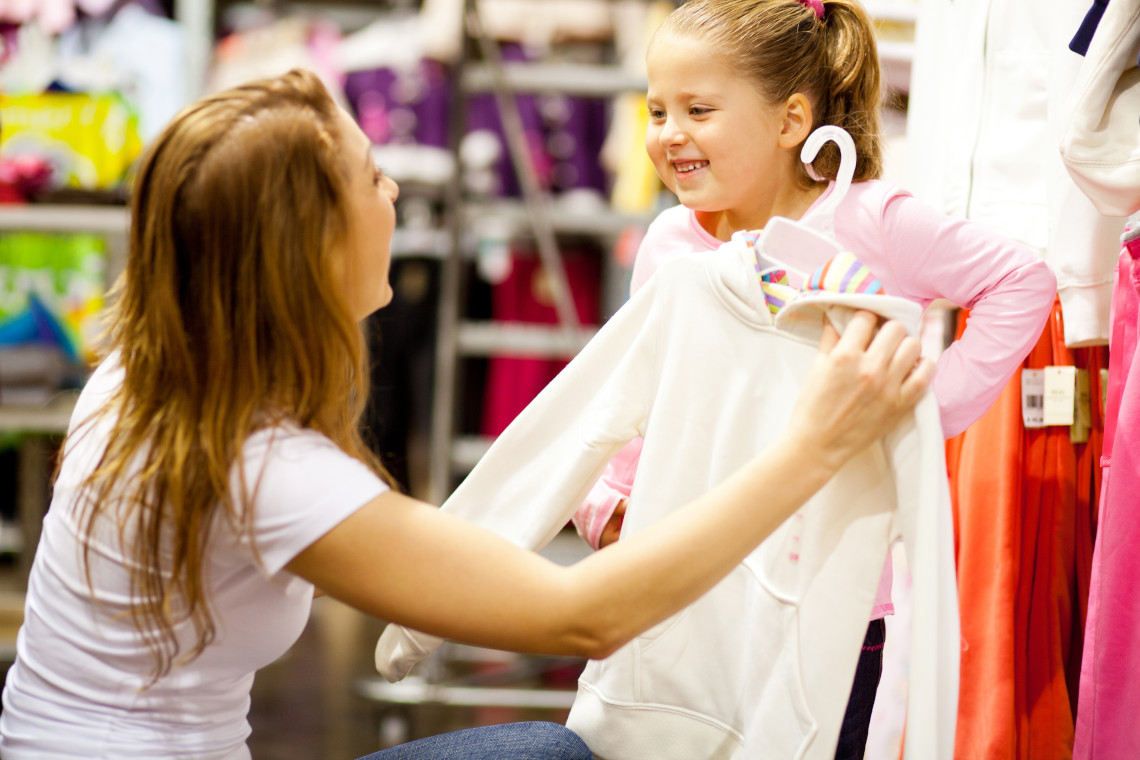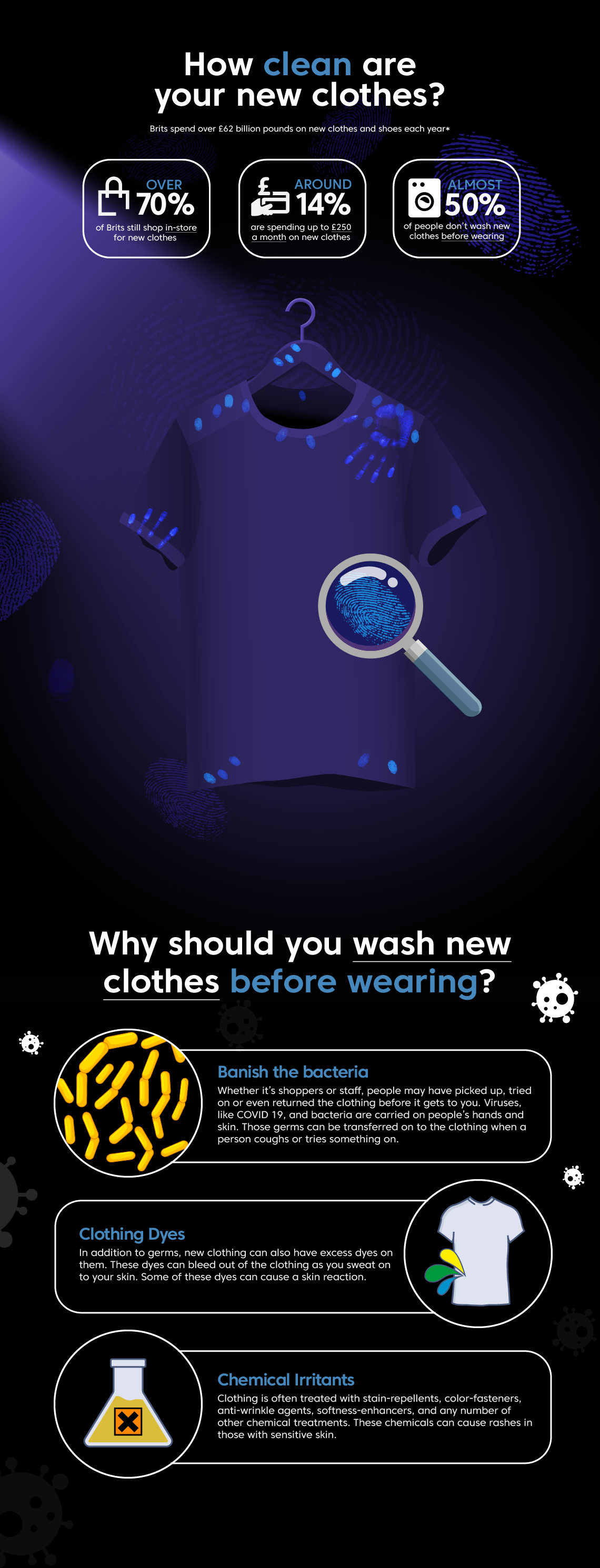How clean are your new clothes and why you should wash before you wear?
Plenty of us like to buy new clothing – in fact, Brits spend over £62 billion pounds on new clothes and shoes every year ! But do we pay close enough attention to where our clothes are coming from, and just how many germs may be lurking on our new clothing? The answer may surprise you!
To help answer these questions, we decided to look at where Brits are buying their clothes, how many of people are choosing to put their new clothes straight into the washing machine, and some of the reasons why washing our new clothing is actually really beneficial.

Where do Brits buy their clothing?
Whilst a large proportion of people (65%) buy their new clothes from online retailers, over 70% of Brits still shop in-store for new clothes. Of those who buy second-hand clothing, 1 in 8 respondents bought online and another 18% bought from second-hand clothing shops and charity shops.
Our purchasing habits each month are also quite surprising, with one in seven (14%) Brits spending up to £250 a month on new clothes! But are these masses of new clothes being washed thoroughly before they are worn and do their owners know exactly what could be sitting within the shopping bags that they take home with them?
How many Brits wash new clothes before they wear them?
According to our survey , nearly 50% (44%) of Brits don’t wash brand new clothes before wearing them for the first time – that’s a lot of people walking around in clothes that have been handled by numerous people in different countries and warehouses. Even more disturbing to consider is the fact that over 20% of people (22%) have worn an item and returned it unwashed!
To ensure your new clothing purchase is fresh and hygienic, we definitely think it’s best to get the washing machine on pronto after buying new clothes. Whether new or second-hand, you don’t need to worry about ruining your new clothes with our AquaTech® washing machine technology, which replaces harsh drum movements to deliver 50% faster, 50% more gentle washes, perfectly protecting your favourite garments in a quicker, kinder wash.

Why is it important to wash your clothes before wearing?
There are several reasons why you should put your new clothes straight into the laundry bag or washing machine when you get home. To help explain why this is so important, our Beko laundry experts, along with Dermatologist Dr Faheem Latheef, have provided insight on some of things lurking on new clothes, and the effect these germs/chemicals could have on our skin.
- Viruses and Bacteria - Whether it’s shoppers or staff, numerous people may have picked up, tried on or even returned the clothing before your purchase. Germs can be transferred to clothing in numerous ways, including coughing or even simply touching. The following viruses and bacteria could be present on your new clothes:
- Viruses, like COVID-19, and bacteria are carried on people’s hands and skin. These germs can be transferred to the clothing when a person coughs or tries something on.
- The most likely virus that could spread from contaminated clothing is the Norovirus, which causes the winter vomiting bug.
- Verrucae or warts are also caused by a virus, and often a HPV virus can spread through shared materials.
- Staphylococcus (staph) is a bacterium that is often found on the skin normally but can cause infection.
- E-coli is another bacterium that can cause severe food poisoning and diarrhoea from things like uncooked meat and could potentially spread from items of clothing.
To effectively eliminate bacteria and viruses from your clothing, consider our HygieneShield washing machines and washer dryer. Featuring a HygieneTherapy programme, these appliances use hot air at high temperatures to kill 99% of bacterial and viruses, leaving your garments perfectly clean and hygienic, without using water.
- Clothing Dyes - In addition to germs, new clothing can also have excess dyes on them. These dyes can bleed out of the clothing as you sweat onto your skin, and some of these dyes can cause a skin reaction, such as contact dermatitis. Some of the dyes used in the clothing that can cause an allergic reaction include:
- Textile dyes – Dyes from coloured clothing can bleed onto the skin causing itchy, dry, scaly, and sometimes sore skin. Many textile dyes are water soluble, meaning, when we sweat, dyes can seep out and can increase the risk of developing an allergy.
- Disperse dyes – these are used to dye synthetic fabrics such as polyester, polyamide, acrylics, and acetate fibres. If you have an allergy to these dyes, we recommend that you wear natural fibre clothing such as cotton, wool, linen, rayon, or viscose, particularly clothing that has direct contact with the skin such as underwear, socks, stockings, exercise clothes, etc. We recommend washing all new dark clothing and bed linens at least twice before use and avoiding fabrics that fade.
- Textile dyes – Dyes from coloured clothing can bleed onto the skin causing itchy, dry, scaly, and sometimes sore skin. Many textile dyes are water soluble, meaning, when we sweat, dyes can seep out and can increase the risk of developing an allergy.
- Chemical Irritants - Clothing is often treated with stain repellents, colour-fasteners, anti-wrinkle agents, softness-enhancers, and any number of other chemical treatments. Some people can also become allergic to a chemical called formaldehyde that is used as a preservative in clothing to stop it from wrinkling such as “non-iron” or “drip dry” items. These chemicals can cause rashes in those with sensitive skin.
Most of these issues can be easily avoided by washing clothing before wearing. Washing clothes, even if they are new, is highly recommended as people may have worn and returned items or tried them in the store. Although normal washing of clothes can reduce the risk of germs being transmitted, in certain situations clothes need to be washed at higher-than-normal temperatures (60 C) to minimise the transmission risk as much as possible. We would also recommend washing all, new dark clothing and bed linens at least twice before use and avoiding fabrics that fade.
Take a look at our guide to washing your clothes hygienically to take you through the best ways to wash your clothes. Before washing new clothes, it is important to read and follow the care labels on your clothes to avoid damage.
Thanks to our expert opinions and insightful data, we hope that the next time you buy new clothes, you’ll consider washing them before wearing them for a prolonged period! And, if you are not sure your washing machine is up to the task, take a look at our incredible range of washing machines and washer dryers for great performance and innovative technology.
Sources:
- https://www.statista.com/statistics/289996/expenditure-on-clothing-and-footwear-in-the-united-kingdom-uk/
- A survey of 1,002 people who purchase their own clothes carried out by TLF in January
- Dr Faheem Latheef is an award-winning Consultant Dermatologist based in Leeds and Dubai on a visiting basis. For more information regarding the treatments that Dr Latheef offers or to make an in-person or virtual appointment, please visit his website and follow him on social media for interesting posts on skin, hair and nail disease.



